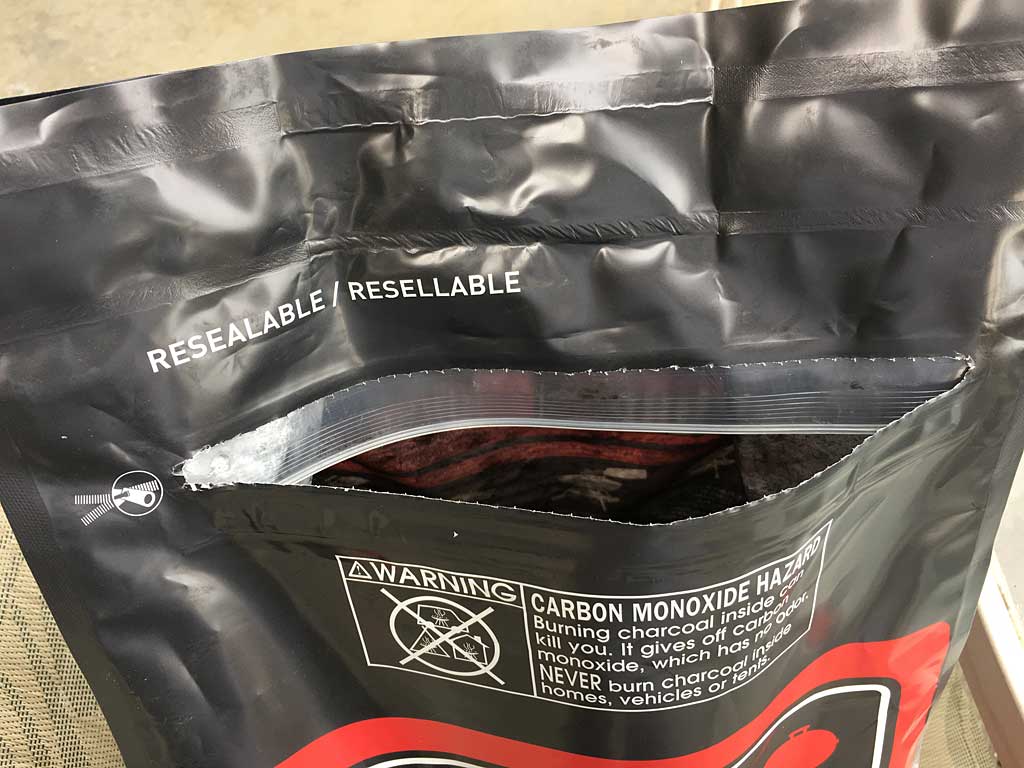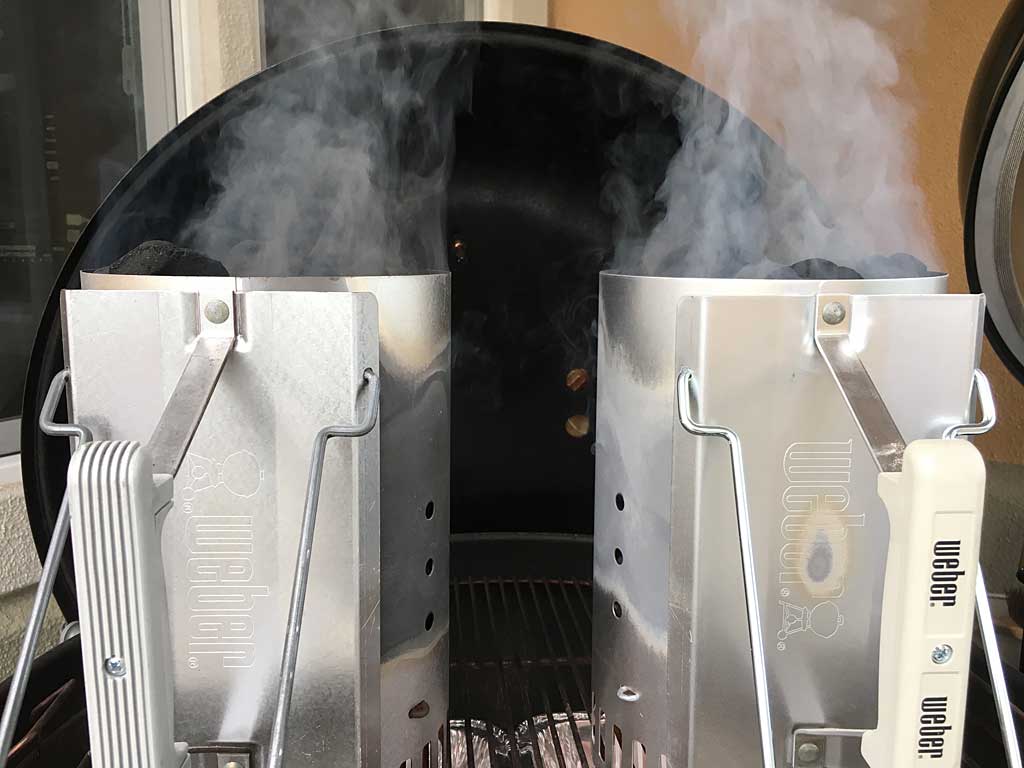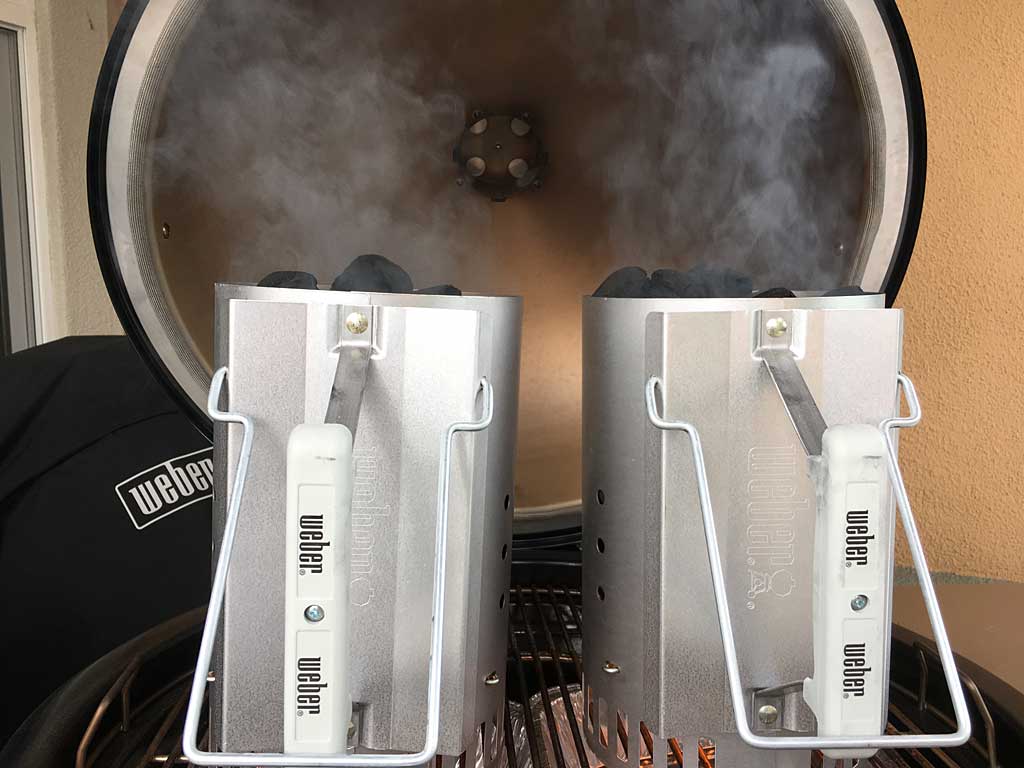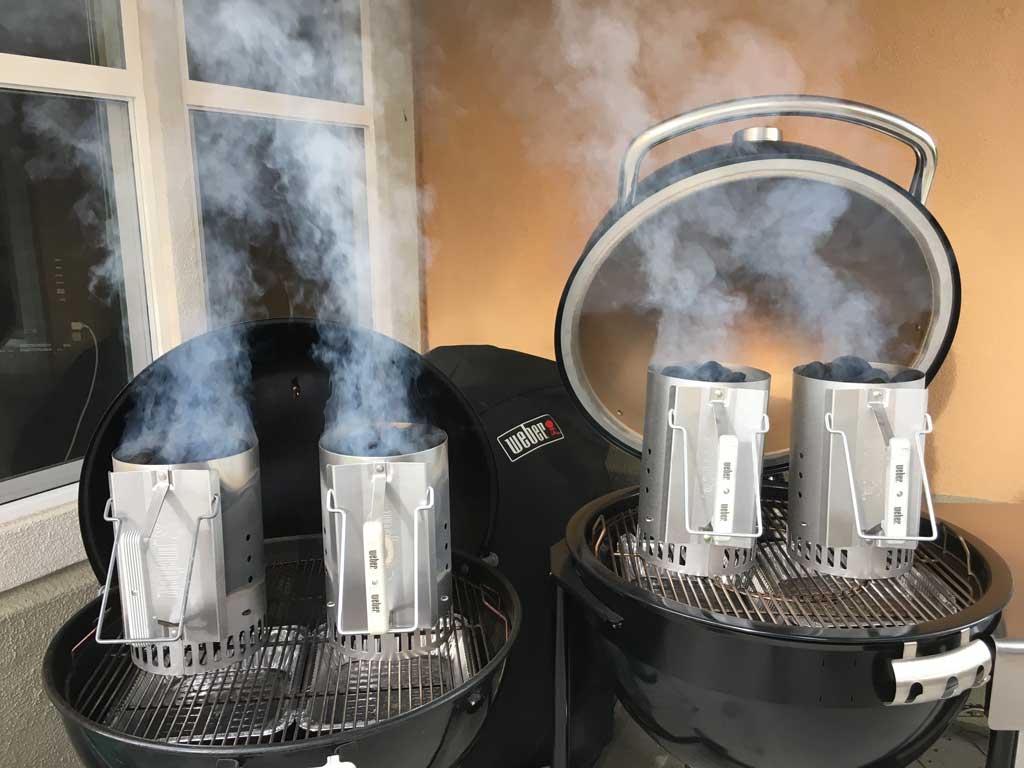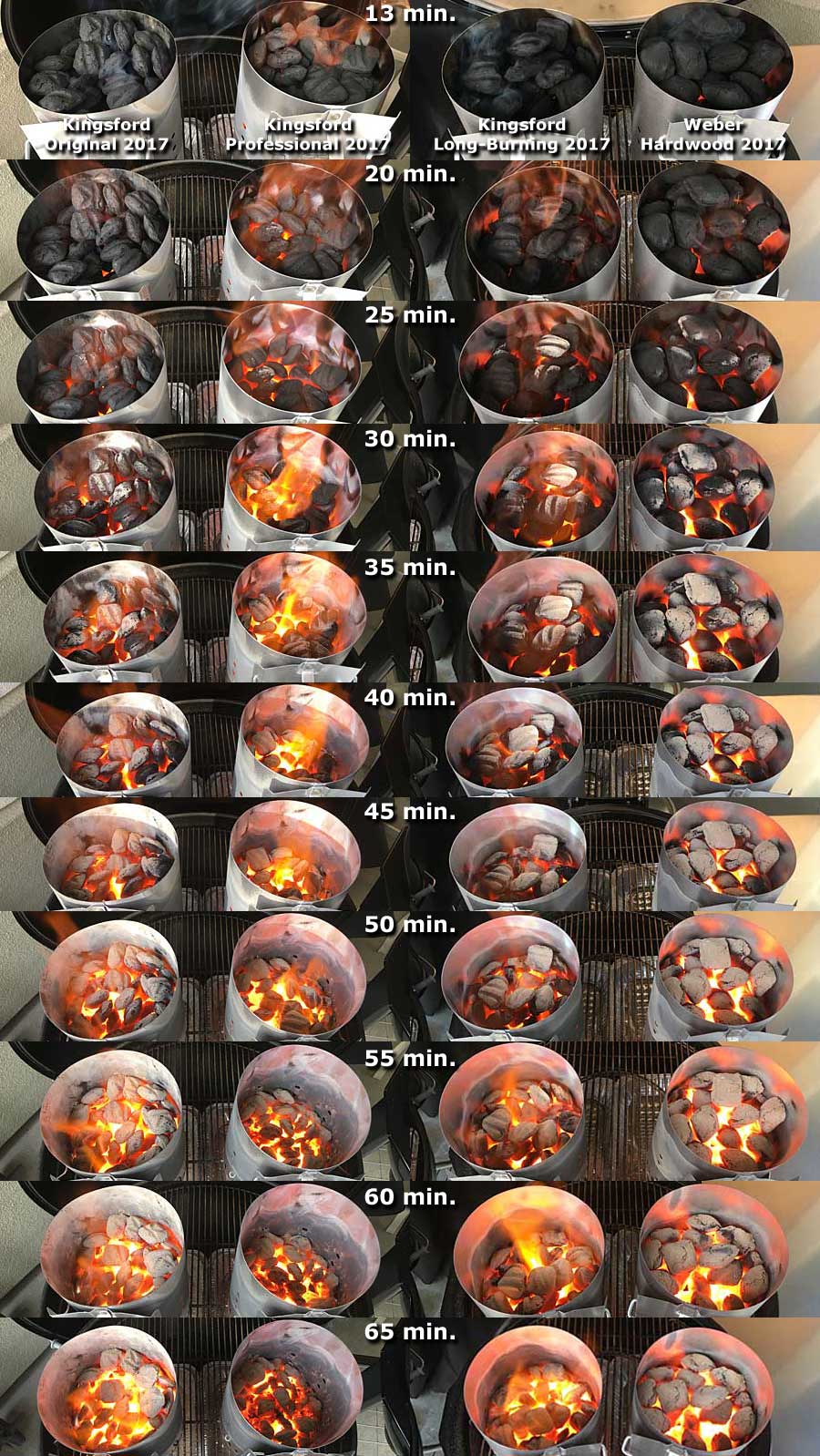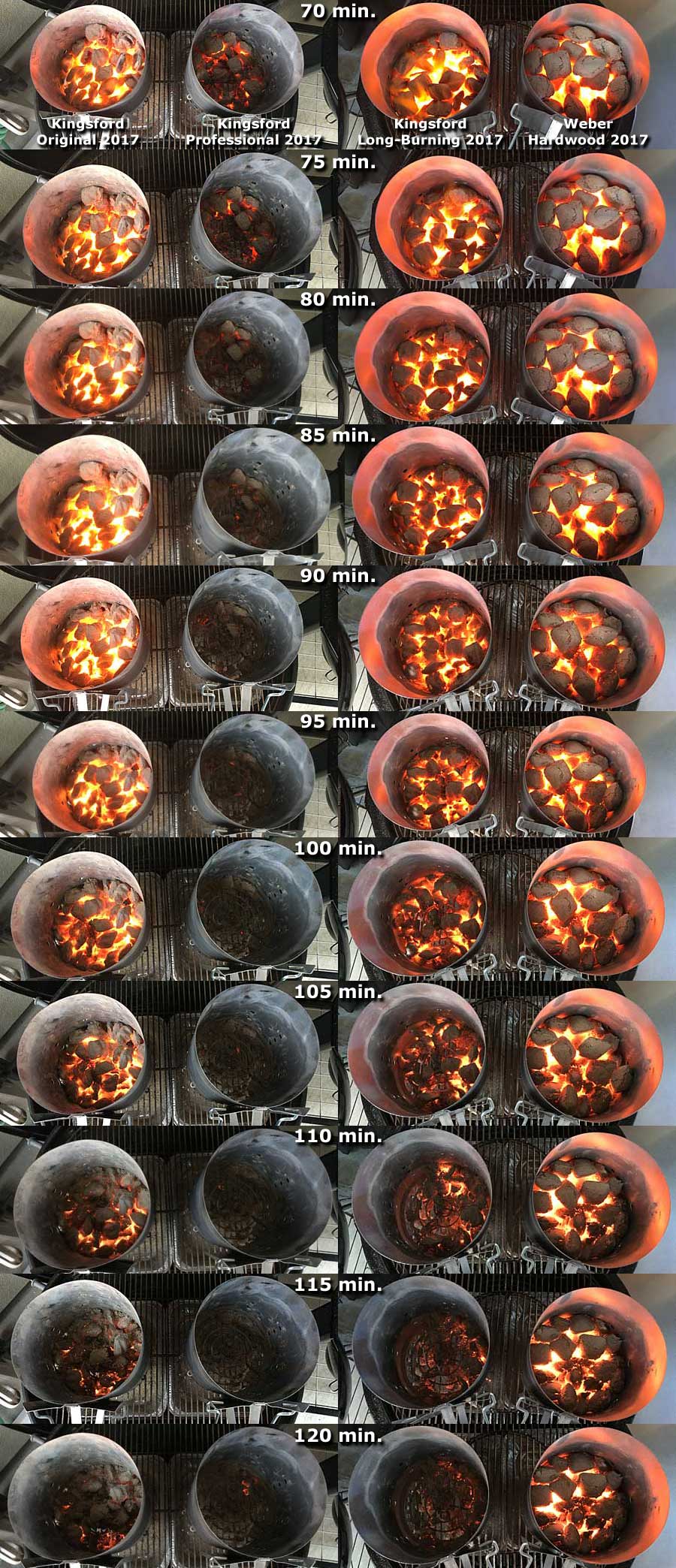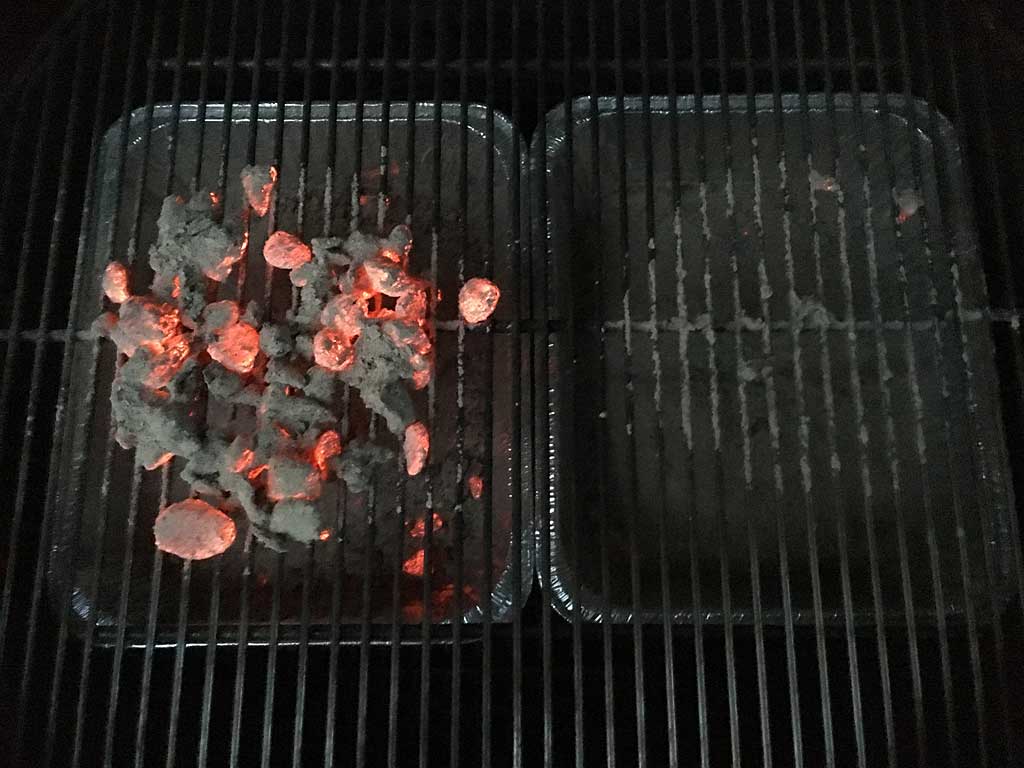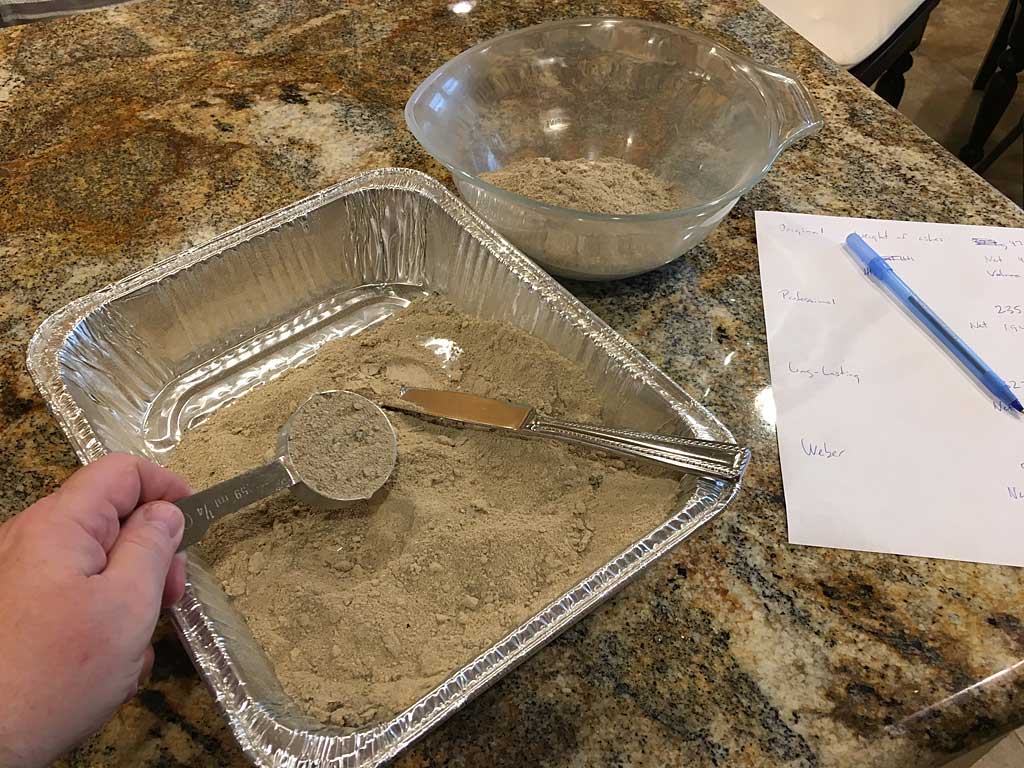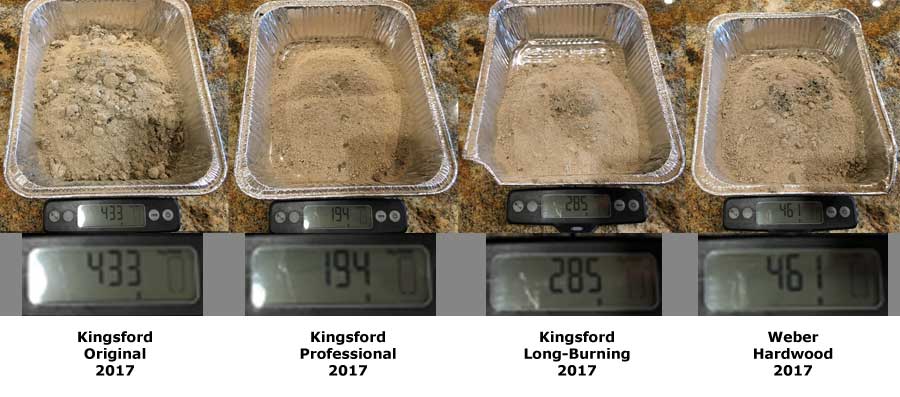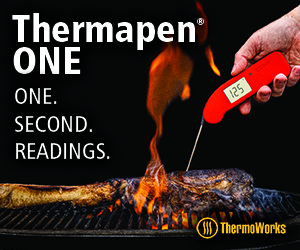In This Topic
- New Kingsford & Weber Charcoal Products For 2017
- Product Packaging
- What Kingsford Says About Long-Burning Briquets
- What Weber Says About 100% All-Natural Hardwood Briquettes
- Comparing Performance Of New & Old Products
- Product Comparison Photos
- Weight Difference Before Burning
- The Burn Test
- Weight & Volume Difference Of Ashes After Burn Test
- Conclusions
- More Kingsford Links On TVWB
New Kingsford & Weber Charcoal Products For 2017
In October 2016, an anonymous source emailed me with information about a new Kingsford charcoal briquet that was supposed to burn longer than Kingsford Original briquets. This source also said that the new charcoal would be tested by a few competition teams at the American Royal World Series of Barbecue later that month, at some of their non-competitive party events.
By Christmas 2016, this new product was revealed to the public as Kingsford Long-Burning Charcoal Briquets and was widely available at Lowe’s Home Improvement Centers across the United States.
In late January 2017, members of The Virtual Weber Bulletin Board posted sightings of a new product at Lowe’s Home Improvement Center called Weber 100% All-Natural Hardwood Charcoal Briquettes. By the end of that month, the product was also seen at The Home Depot, and Weber started an advertising blitz for the new charcoal on social media and direct email.
Product Packaging
Here are photos of the packaging of each product. The Kingsford product comes in a traditional paper bag.
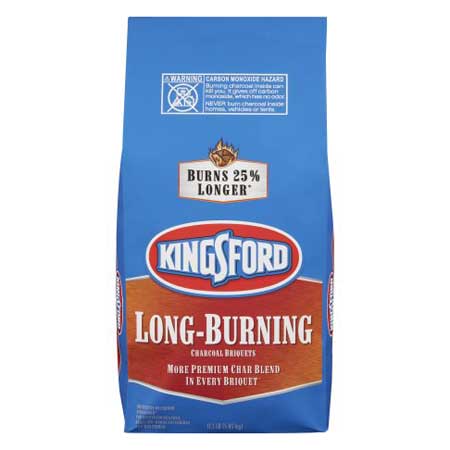
The Weber product comes in a thick plastic bag with a resealable zipper lock opening.
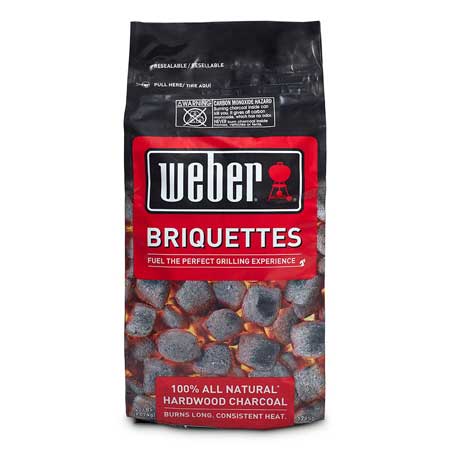
What Kingsford Says About Long-Burning Briquets
Kingsford makes the following claims on the bag of their new 2017 long-burning briquets:
- Burns 25% longer*.
- Long-burning performance for grilling, smoking and slow cooking.
- More premium char blend in every briquet*.
- Ready in about 15 minutes.
- 11.1 LB.
- Made in USA of globally sourced ingredients.
* Compared to Kingsford Original Charcoal Briquets.
What Weber Says About 100% All-Natural Hardwood Briquettes
Weber makes the following claims on the bag of their new 2017 all-natural hardwood briquettes:
- Fuel the perfect grilling experience.
- 100% all-natural hardwood charcoal.
- Weber briquettes are made from all-natural hardwood, with no chemicals added. The briquettes ignite quickly and provide steady heat for long grilling times.
- Resealable.
- 20 LB.
- Made in USA.
Comparing Performance Of New & Old Products
I decided to conduct a burn test comparing the new Kingsford and Weber charcoals against two popular products: Kingsford Original Briquets and Kingsford Professional Briquets (formerly known as Competition Briquets).
The objective was to see:
- Which charcoal appeared to burn the longest
- Which charcoal produced the least ash
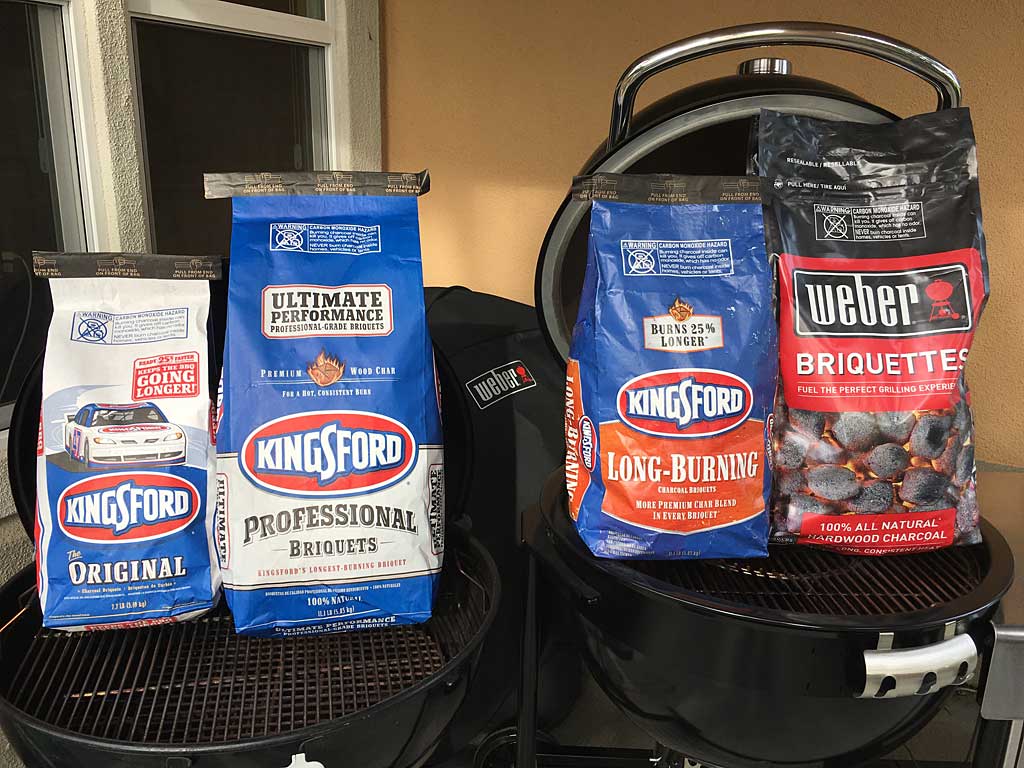
From left to right: Kingsford Original, Kingsford Professional, Kingsford Long-Burning, Weber 100% All-Natural Hardwood
Note: Kingsford provided the bag of Long-Burning charcoal shown in these photos free of charge to The Virtual Weber Bullet for evaluation purposes. The bag of Weber charcoal and the bags of Kingsford Original and Kingsford Professional were purchased by me at Lowe’s and The Home Depot in San Jose, CA. The formulation of the test and the test results described below are mine alone, without any input, review or approval from Kingsford or Weber.
Product Comparison Photos
Here are side-by-side photos of all four briquets. The three Kingsford products appear to be essentially the same in terms of shape, size, and impressions on each briquet. Each has the distinctive Kingsford “K” stamped into one side and two diagonal “Sure Fire Grooves” stamped into the other side. However, differences in weight between the three briquets is clear, especially when holding several briquets in each hand.
In contrast, the Weber briquette is much larger, thicker, and heavier than any of the Kingsford briquets. There is nothing stamped into either side of the briquette and the surface of each briquette appears somewhat cracked and loose compared to the Kingsford briquets.
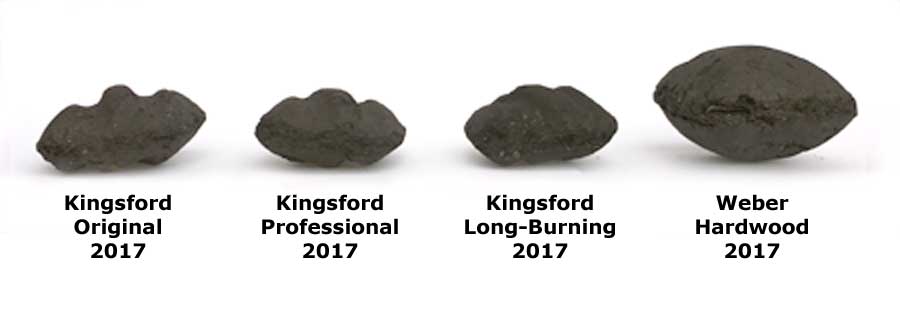
Profile view of Kingsford Original, Kingsford Professional, Kingsford Long-Burning, Weber 100% All-Natural Hardwood
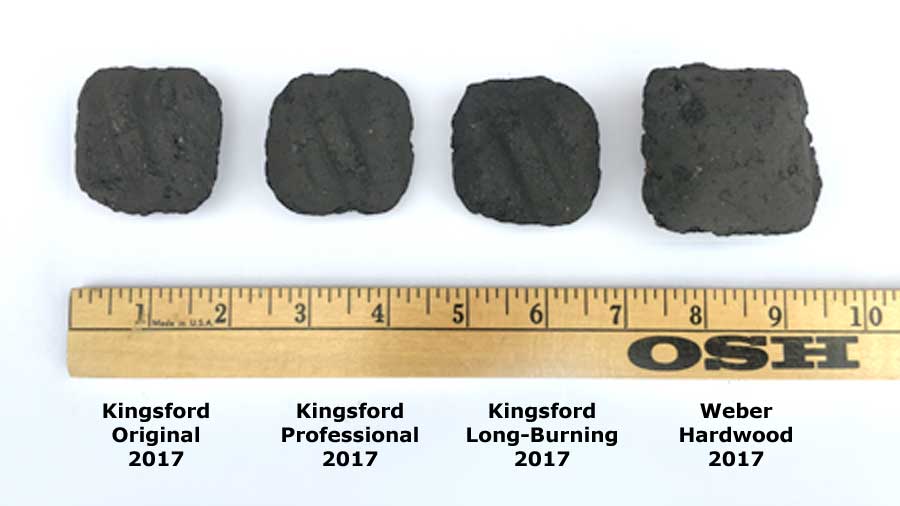
Overhead view of Kingsford Original, Kingsford Professional, Kingsford Long-Burning, Weber 100% All-Natural Hardwood
Weight Difference Before Burning
I counted out 100 of each briquet and weighed them using an electronic kitchen scale.
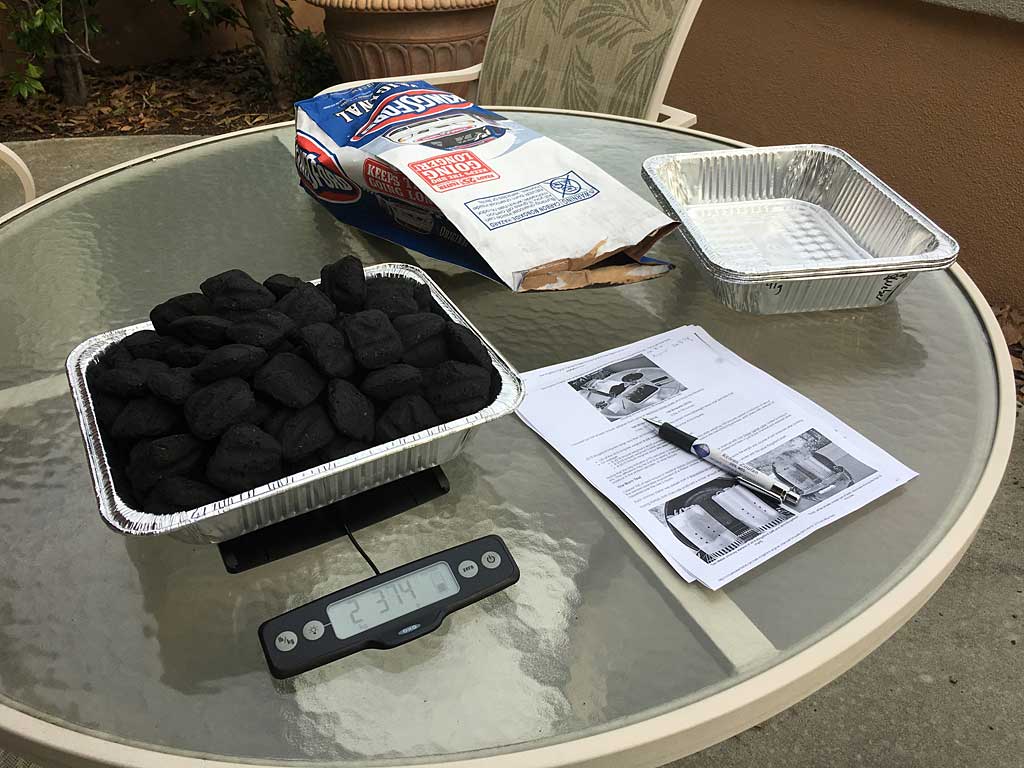
The weight of each pan was noted in grams, then the net weight of
100 briquets, then the briquet name.
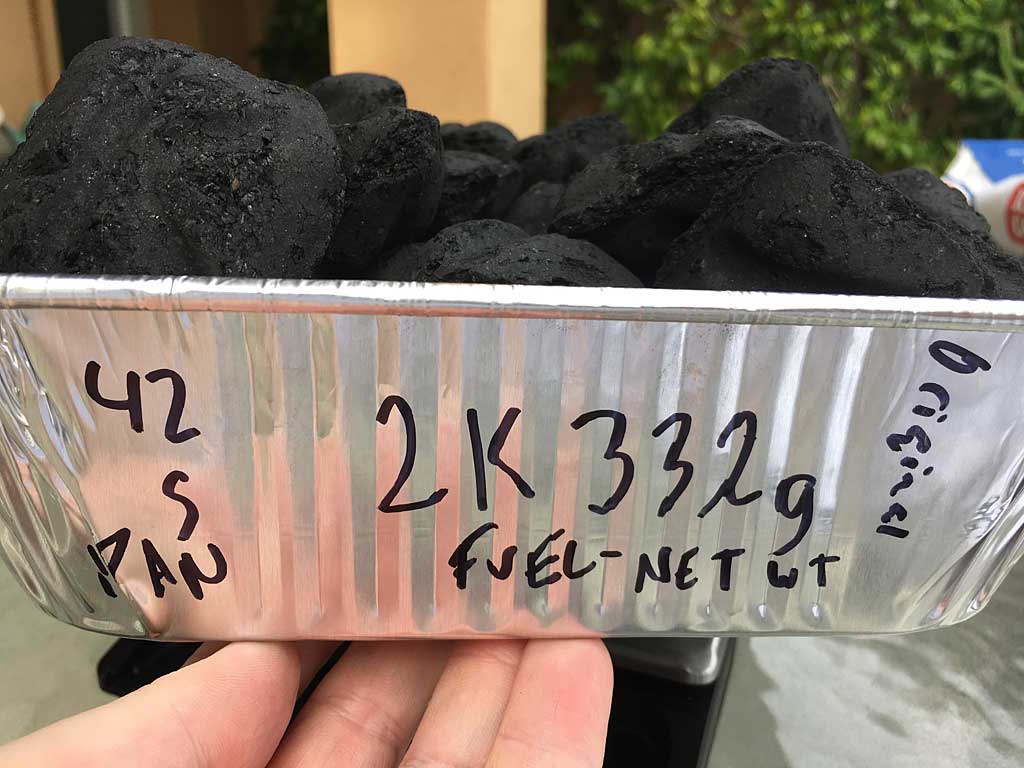
When I got to the Weber briquettes, I quickly realized they were so big that 100 of them would not fit into a Weber chimney starter for the burn test. Instead, I filled the chimney with Weber briquettes to the same level as 100 Kingsford briquets, which turned out to be 56 Weber briquettes.
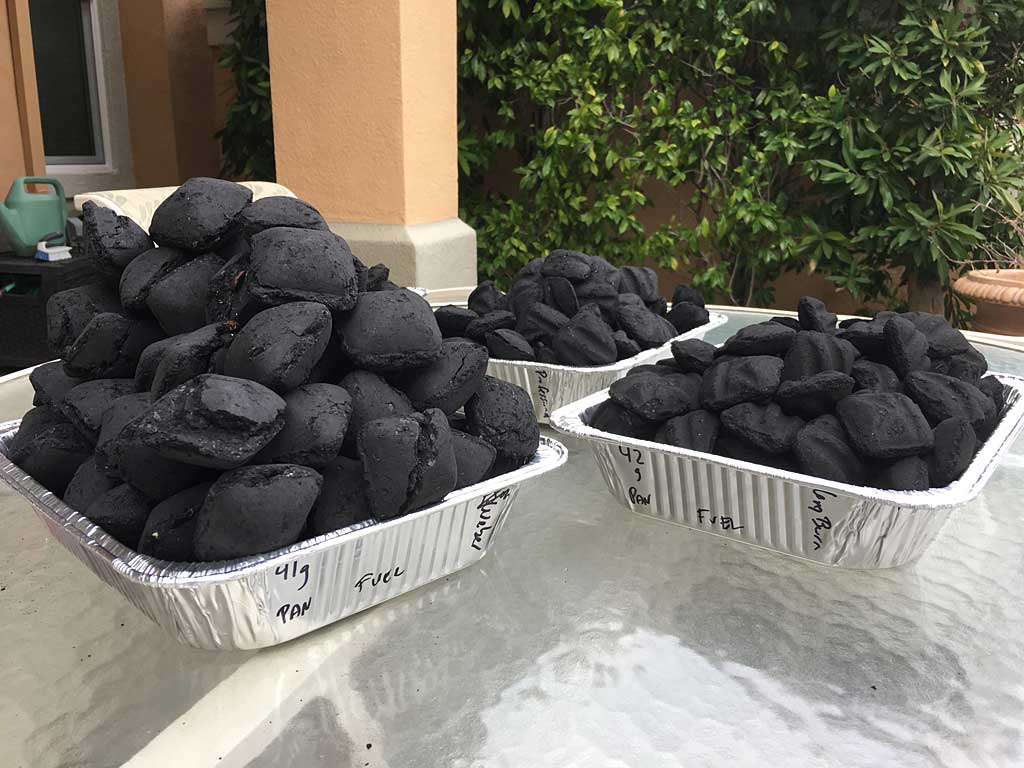
100 Weber briquettes (left) are so big vs. Kingsford briquets (right) they won’t all fit into a Weber chimney starter, so the number of Weber briquettes was reduced to 56
- The new Kingsford Long-Burning Briquets weighed virtually the same as Kingsford Original Briquets.
- On average:
- A Kingsford Original briquet weighed 23.32 g / 0.823 oz.
- A Kingsford Professional briquet weighted 18.66 g / 0.658 oz.
- A Kingsford Long-Burning briquet weighed 23.15 g / 0.817 oz.
- A Weber hardwood briquet weighed 44.16 g / 1.56 oz.
The Burn Test
I placed 100 of each Kingsford briquet and 56 Weber briquets in identical Weber chimney starters and lit the charcoal with one Weber lighter cube. Unlike burning in the vent-controlled environment of a Weber smoker, this was an uncontrolled burn test—I just lit the charcoal and watched what happened over the next 2 hours.
Each chimney starter was placed over a disposable foil pan so I could measure the weight and volume of ash produced after burning. Some ash was lost during the burn test—it got carried away by the heat rising out of the chimney starter (a light dusting of ash covered the work table next to my grills)—but this test would still provide a good sense of which charcoal produces the most ash and which produces the least.
During startup, each charcoal produced a similar amount of smoke, but the Kingsford Professional’s smoke was whiter than the others.
You’ll notice in these photos that the charcoal fills each chimney starter to about the same level—just to the top.
What follows are side-by-side photos comparing the burn of each product over 2 hours.
Notice that the first signs of gray ashing occur in the Kingsford Professional briquets at 20 minutes. There may be the slightest bit of visible ashing on the Weber briquets, too.
At 30 minutes, all charcoals are ashing over, but the Kingsford Professional is burning more intensely than the others and continues to do so for the next 20 minutes and then starts dying down.
At 90 minutes, the Kingsford Professional has burned out almost completely, while the other samples are still burning.
Notice that during the last 30 minutes, the Kingsford Original and Kingsford Long-Burning appear to burn about the same and are mostly consumed at 120 minutes…but the Weber briquets are still burning.
Weight & Volume Difference Of Ashes After Burn Test
After two hours, I tapped each chimney so that all ashes fell into the foil pan below. I poured the leftover hot coals onto the grate and moved them around with tongs to remove any loose ash. What you see in the photo below (left) is the unburned charcoal that was too large to fall through the grate.
I placed the leftover charcoal in each foil pan and let it burn out completely and cool overnight. The next day I weighed each pan and subtracted the weight of the pan to determine the net weight of the ashes. To measure the volume of ashes, I used the “dip & sweep” method using measuring cups, similar to how you measure flour when baking.
| Kingsford Original | Kingsford Professional | Kingsford Long-Burning | Weber Hardwood | |
| Net Weight of Ashes | 433 g / 15.27 oz | 194 g / 6.84 oz | 285 g / 10.05 oz | 461 g / 16.26 oz |
| Volume of Ashes | 5 cups | 3 cups | 4-1/4 cups | 6 cups |
| Percentage of Ashes | 433 g ÷ 2.332 kg = 18.6% | 194 g ÷ 1.866 kg = 10.4% | 285 g ÷ 2.315 kg = 12.3% | 461 g ÷ 2.473 kg = 18.6% |
Conclusions
In an uncontrolled burn test:
- Kingsford Long-Burning Briquets did not appear to burn 25% longer than Kingsford Original Briquets, despite “more premium char blend”. Both charcoals appeared to burn about the same over the 2 hour test period, but Long-Burning produced less ashes by weight and volume than Original.
- Weber 100% All-Natural Hardwood Charcoal Briquettes appeared to burn longer than the three Kingsford charcoals. It produced slightly more ashes by weight and 20% more ashes by volume than Kingsford Original, but the same percentage of ashes at 18.6%.
- Kingsford Professional Briquets burned faster and more intensely than the other three charcoals. It produced the least ashes of any sample by weight and volume, and had the lowest percentage of ashes at 10.4%.
Given that Kingsford Long-Burning’s performance appeared to be about the same as Kingsford Original, and that Original goes on sale several times a year at 27¢ per pound, it does not seem that Kingsford Long-Burning is worth the higher price unless you value “more premium char” or a modest reduction in ash production from your briquet.
Weber’s new charcoal offering is intriguing because it appears to burn longer than any of the Kingsford products and with the same percentage of ash production as Kingsford Original, but with 20% greater ash volume than Original and at a much higher cost of $1 per pound versus Kingsford Original’s 27¢ per pound sale price.
Kingsford Professional appears to burn quickly and intensely and is probably best suited for high-temp grilling or in smokers where low ash production is desired.
Please keep in mind that I’m unable to make any claims about which of these charcoals burns the longest in a cooker because I did not test them that way. Your experience when cooking with these fuels may vary from my burn test results. Also, I can’t make any claims about which charcoal contains the most energy. For example, even though the Weber charcoal appeared to burn longer than Kingsford Original, that doesn’t automatically mean it contains more energy. It may just burn “low and slow” versus Original in this type of uncontrolled burn test.
More Kingsford Links On TVWB
- Burn Test 2022: Kingsford Original vs Franklin Barbecue vs B&B Competition Oak Charcoal Briquets
- Burn Test: 1984 Kingsford vs 2020 Kingsford
- Kingsford Professional Briquets Replace Competition Briquets
- New Kingsford Original Charcoal Briquets Formula For 2015
- Kingsford Charcoal Briquets – Minor Changes For 2010
- Kingsford Competition Briquets – New For 2009
- Kingsford Charcoal Briquets – New Design, New Formula For 2006
- Kingsford R&D Lab Trip Report
- All About Charcoal

